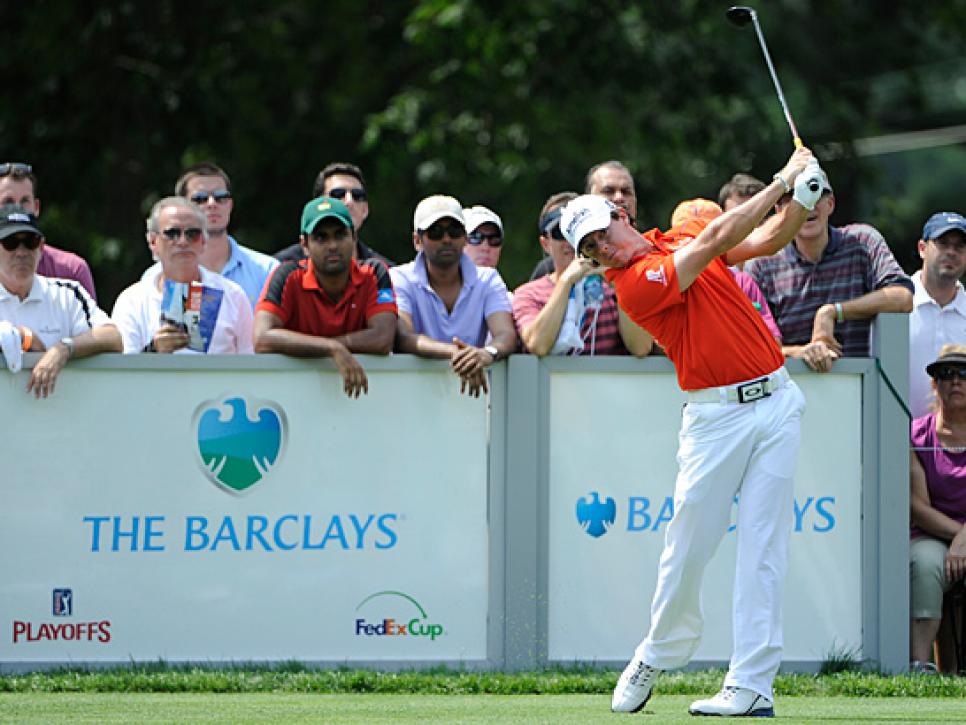News
Package Deal

Rory McIlroy's strong play in his first appearance has helped the FedEx Cup Playoffs.
This has to be exactly what the PGA Tour had in mind when the FedEx Cup Playoffs were launched in 2007. Talk about creating postseason buzz and pennant-race fever going into East Lake and this week's Tour Championship. It is as if the tour's marketing department had handpicked the 30-man field and seeded them.
OK, maybe many fans still don't entirely understand the point system and its resets, but who cares? Look who we have contending for the $10 million FedEx Cup bonus this week.
One-third of the field has won major championships, 21 of the top 22 in the Official World Golf Ranking are on hand (missing only Graeme McDowell) and the top two in FedEx Cup points -- Rory McIlroy and Tiger Woods -- are the two best players in the world.
Here is all you really need to know as you watch play unfold this week: If any of the top five in FedEx Cup points coming into East Lake -- McIlroy, Woods, Nick Watney, Phil Mickelson and Brandt Snedeker -- win the Tour Championship, they win the FedEx Cup. But here's something else that's pretty cool: All 30 in the field have a mathematical chance to win.
Granted, the math for some is more difficult than for others. The scenario for No. 30 Scott Piercy, for example, is pretty remote. He has to win while McIlroy finishes 29th or worse and Woods finishes sixth or worse with Watney and Mickelson third or worse. But it's neat that the chance does exist.
And for everyone there is the opportunity to move up in points and get a greater slice of the $35 million in FedEx Cup bonus money. The disparity between No. 1 and No. 2 -- $10 million versus $3 million -- is extremely dramatic, but moving from No. 30 ($175,000) to No. 10 ($500,000) is also a nice tax problem to have.
When PGA Tour commissioner Tim Finchem announced the idea for the FedEx Cup at the 2006 Tour Championship, it was greeted with skepticism and concern. For 70 years, we had been taught to measures players by two matrices: Money and majors. Now we were going to be asked to think points and playoffs.
What we need to do here is the exact opposite of what every sports psychologist suggests and focus not on the process but on the results. Here is what the system has produced: Three rather remarkable playoff events that have created an extremely compelling field for the Tour Championship.
Look what we have been served up so far in the playoffs. The Barclays at Bethpage Black (and how great is that venue) was won by Watney with Snedeker, Dustin Johnson and Sergio Garcia chasing him.
At the Deutsche Bank Championship, McIlroy held off Louis Oosthuizen, Woods, Mickelson and Johnson; and Rory followed that with a win in the BMW over Lee Westwood, Mickelson and Woods.
I mean, really, back in the old days -- the pre-FedEx Cup Days -- names of that stature had gone fishing by now, packing it in after the PGA Championship and were just biding their time until the November Tour Championship and the free money of the Silly Season.
OK, what the FedEx Cup Playoffs don't do is determine the Player of the Year. Even if McIlroy doesn't win this week, he likely will be voted POY by his peers. What the FedEx Cup Playoffs does accomplish is determine the champion of a really unique and compelling event. And what's wrong with that?
Golf is a game both buoyed and bound by its past. For eight decades, Augusta National GC refused to invite a woman to be a member. But when times changed and women moved into the previously all-male boardrooms of Fortune 500 companies, the club changed as well. And when chairman Billy Payne said Condoleezza Rice and Darla Moore had been invited to join, he did it in such a way as to imply that it was well past time for the move.
Yes, golf is a game where change does not always come easily, and in many, if not most cases, that stubborn refusal to let go of tradition is a good thing. But what the PGA Tour has done in creating the FedEx Cup has proven to be a positive break with the past.
Next year, even more change comes when the 2014 season will begin in October of 2013, right after the Tour Championship ends and the FedEx Cup Playoff winner is determined. Already the naysayers are lamenting the break from the January start of the season and the devaluation of Q school.
But let's wait and see before we pass judgment. Like the FedEx Cup, the 12-month season may turn out to be a good thing. One important concept to grasp when evaluating all of this is that there is a difference between the business of professional golf and the beauty of the game.
The PGA Tour is evolving to make itself more relevant in the increasingly competitive world of sports, where it goes up against not just the other professional leagues but also the formidable foe of college football. It has made, in my mind, some smart moves in that regard.
The FedEx Cup has people talking about golf at a time of the year when that was not the case. The three playoff events have been extremely compelling tournaments with dream leader boards, and the stage is set perfectly for the Tour Championship.
Now it is all up to the players. How cool would it be to have Woods and McIlroy in the final group on Sunday? The past and the future fighting for dominance in the present. And the way this year's playoffs have gone, that's probably what we'll get. This is a FedEx Cup that has delivered.